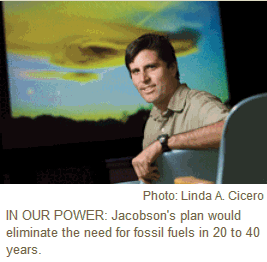|
News & Views item - August 2012 |
![]() Mark Jacobson and Solving the Energy/Pollution
Enigma. (August 9, 2012)
Mark Jacobson and Solving the Energy/Pollution
Enigma. (August 9, 2012)
 Allowing some paraphrasing, unless the nations'
leaderships begin to show some guts "nations will keep trying technologies
promoted by industries rather than vetted by scientists". And among other
factors that's "going to take ongoing education."
Allowing some paraphrasing, unless the nations'
leaderships begin to show some guts "nations will keep trying technologies
promoted by industries rather than vetted by scientists". And among other
factors that's "going to take ongoing education."
Back in February 2011 TFW noted Providing All Global Energy With Wind, Water, and Solar Power is Feasible Say University of California & Stanford Researchers and cited a new study – co-authored by Stanford researcher Mark Z. Jacobson and UC-Davis researcher Mark A. Delucchi. Now some 18-months have passed and Professor Jacobson hasn't changed his tune.
In a talk given this past March to Stanford Blood Center's Café Scientifique Professor Jacobson who directs Stanford Universiy's Engineering's atmosphere/energy program claimed 100% of the world's energy requirements could be provided by wind, water and the sun, eliminating all need for fossil fuels within 20 to 40 years: "That means electricity, transportation, heating, cooling and industrial processes—everything we use energy for." In fact according to Professor Jacobson's assessment such a conversion would of itself reduce global power demand by 32%.
Furthermore, currently available technologies for the utilisation of wind, tidal and wave power; photovoltaic panels; battery-electric and hydrogen fuel cell vehicles; hydroelectricity; and methods to capture geothermal energy are capable of bringing the conversion to completion were the will to do so in existence: "All of them work or are close to working today on a large scale; they're not distant possibilities that may exist 20 or 30 years from now. They also produce hardly any greenhouse gases and air pollutants at any time in their life cycle—from construction and operation to decommissioning. It's not rocket science, it's just a matter of optimisation."
What is required is the setting up of a global grid to fully address base-load requirements.
In his address Professor Jacobson then undertook to disabuse his audience concerning nuclear power, carbon sequestration and ethanol-based fuel: "Nuclear power results in up to 25 times more carbon emissions than wind energy, when you consider reactor construction, uranium refining and transport, and the 11 to 19 years between planning and operation of a nuclear reactor while carbon capture technology can reduce carbon dioxide emissions from coal-fired power plants but will increase air pollutants—and itself requires more coal to be burned to power its own capture and storage steps. As to ethanol, even the most ecologically acceptable sources of it create air pollution that will cause the same mortality level as when gasoline is burned."
He does agree that: "Some combination of subsidies and carbon taxes will be needed for a time," but eventually the renewable sources will be as inexpensive as traditional sources. "With sensible policies, nations could generate 25 percent of their new energy supply with renewable sources in 10 to 15 years, and almost 100 percent of new supply in 20 to 30 years. "With extremely aggressive policies, all existing fossil fuel capacity could theoretically be retired and replaced in the same period, but it's more likely that full replacement may take 40 to 50 years, [but] clear leadership is needed, or else nations will keep trying technologies promoted by industries rather than vetted by scientists. It's going to take ongoing education."